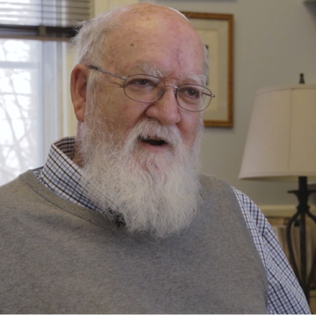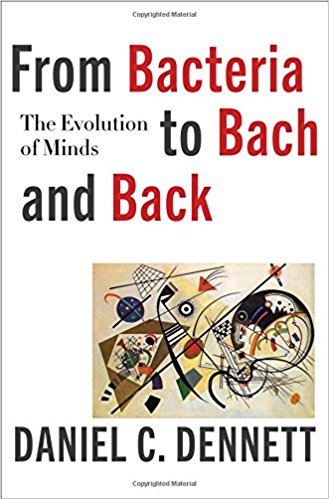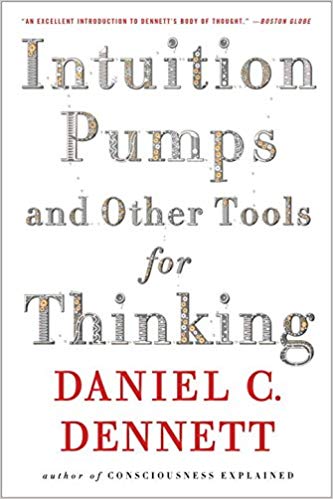Psi
Menu
III - THE INTERVIEWS
Chapter 17
Daniel Dennett: The Wizard of Cambridge (Feb 2015)
Daniel Dennett: The Wizard of Cambridge (Feb 2015)
|
While in Boston, I also had the great pleasure of interviewing Daniel Dennett, professor of philosophy and co-director of the Center for Cognitive Studies at Tufts University. Dennett is probably the “biggest” name in my cast of experts, partly due to his status as one of the most influential philosophers of our time, and partly because of his regular media presence as an outspoken atheist and secularist. The thing that struck me upon meeting him was how much of an imposing character he is. He waltzed into his office with heavy boots and a walking stick like a wizard who had just hiked down from a mountain, exchanged pleasantries with his assistant and welcomed me with a deep, warm voice and a mischievous tone that hinted at a combative spirit waiting to be tested. As part of this charming introductory act, when he remembered that I am French, he started humming a tune which eventually turned into him singing a classic French folk song by George Brassens: “Les amoureux qui s’bécotent sur les bancs publics...” At that point, I felt a little silly bringing this great man back to the less gleeful subject of free will and determinism.
Dennett is a compatibilist on the issue of free will, meaning that he believes free will is possible in the context of determinism - but it's important to understand that when he says "free will", he doesn't mean it in the same way as the others, the libertarian philosophers. To him, free will should be understood as the moral competence to be responsible for your actions: this just means having the physical and mental capacity to freely act upon your intentions. And as such, this doesn't require any real randomness in the universe. Basically, so long as no one forced you to do something, and you are of able body and sound mind, you can be held morally responsible for your actions, and that's what it means to have "free will." As such, determinism poses no threat to free will, which is why this conception is called "compatibilism,", as it's compatible with a deterministic view of the world.
On the flipside, he claims that the libertarian conception of free will is wrong and amounts to nothing more than wishful thinking on the part of those who want to feel like they can "change the future." Being a cognitive scientist, Dennett has spent much of his career studying the broader subject of consciousness and so his view of libertarian free will should be understood in the context of his claim that consciousness itself is just a “bag of tricks.” As such, he concedes that there is, indeed, no “absolute free will,” in the sense of a soul or an élan vital that is calling the shots, exempt from the laws of nature. And regarding the libertarian kind of free will, he doesn’t think it’s possible because he believes that quantum randomness has no effect on human brains. Although actually, he doesn't say it's impossible. He gladly grants the possibility of an amplified quantum event in the brain (thus not shutting the door on the possibility of a libertarian free will per se), he just claims it’s “not worth wanting,” because the brain’s ability to “pseudo-randomly generate” thoughts is a good-enough source of randomness, if and when needed. The undesirability of the libertarian free will was something that left me rather puzzled though, and I still don’t quite understand why he’s so adamant that it’s pointless. In his view, it's not worth wanting because free will, as he defines it, has nothing to do with being free from determinism, but, as mentioned above, with “being morally competent” - the requirements of which can be found by studying biology as opposed to physics: the ability to collect reliable information from the environment, to reason and be rational, to have desires and ambitions which are not forced or coerced and to act freely upon them in a way which is consistent with the causal laws of nature and will have the predictable outcome. And for all that, there's no requirement for any actual, real quantum randomness - pseud-randomness is good enough and we know the brain can do it. And so, to the question “Do we have free will?” he’ll reply with his usual aplomb: “Do we have the magical kind of free will many people want? No. But who cares? Do we have a free will worth wanting, yes we do. And that’s all that matters.” With Dennett, there is always a matter-of-fact, voilà tone to what he says that makes him equally convincing and infuriating!
|
|
On the one hand, his “magic” response is frustrating because I don’t think the libertarian kind of free will is magic. I for one don’t see it that way. My intuitive interest in libertarian free will certainly doesn’t mean that I hope there’s real magic in the Universe – it just means I’m interested in whether such a conception of free will is scientifically possible. So he loses me a bit when he goes down that road, because I don’t think that the only alternative to compatibilism is magic.
But on the other hand, his response points to something in Dennett’s work with which I must say I feel much sympathy: his battle against wishful thinking and feel-good mysticism. He compares the task of explaining consciousness and free will to that of revealing the secrets of stage magic, in that it is a “thankless task” which is going to hurt the sensibilities of people who have bought into being “fooled, bamboozled and awe-struck.” As such, he bemoans being often branded as a “spoilsport” and a “party-pooper.” Interestingly, there is another source of wonder to which the stage magic metaphor can apply, even more directly in fact: cinema. Indeed film is an elaborate trick and the fascinating thing is that it hinges not on making people think that what they are watching is real, but that it is believable. This is what the French call “la magie du cinema,” the magic of cinema, in that it can make things which are clearly not real seem believable. Like with stage magic, in film we want to be fooled by the trick; this is why films strive to hide their artificiality by following rules such as not breaking the fourth wall, ensuring continuity and more generally keeping off-screen anything that reveals how it was made (boom mics popping into the shot, cameras reflecting in windows, crew members in the background, etc.).This is why usually, good films don't feel contrived, memorable characters are credible; inversely, bad movies are not just those that are unbelievable from the start, but that lost the audience’s commitment midway. How many times have you been watching a film that had you hooked and invested up until something happens that is just so blatantly inconsistent with the plot or so utterly unbelievable (within the rules of the story) that from that point onwards you withdrew your stakes in the film and lost interest? In those instances, you rightfully feel a little cheated, as though the filmmaker, to whom you opened your emotional space and trusted to reward you with a fulfilling experience, abused you with a cheap trick.
This all points to a fundamental concept in filmmaking which is “suspension of disbelief”: the audience is a cooperative, consenting passenger to start off with in that it will accept to believe the world that the filmmaker is offering in order to buy into the story and enjoy the ride. However this suspension of disbelief is not infinitely elastic and filmmakers can’t overstretch it, other wise it will snap and the audience will be gone.
How much “suspension of disbelief” can we have in real life, I wonder? |



